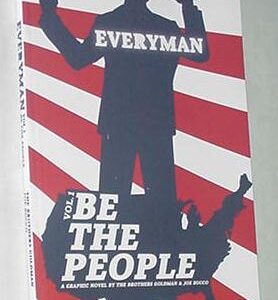Addicted to War Graphic Novel Why U.S. Can’t Kick Militarism Joel Andreas NM Cond AK Press
$39.99
Description
Addicted to War: Why the U.S. Can’t Kick Militarism Paperback
by Joel Andreas (Author)
ADDICTED TO WAR takes on the most active, powerful and destructive military in the world. Hard-hitting, carefully documented with 161 reference notes, and heavily illustrated, ADDICTED TO WAR reveals why the U.S. has been involved in more wars in recent years than any other country. Read ADDICTED TO WAR to find out who benefits from these military adventures, who pays and who dies. This book should be required reading for every American…I learned more about our country’s history by reading this than I did in 4 years of high school.
“Addicted to War is must reading for all Americans who are concerned with understanding the true nature of U.S. foreign policy and how it affects us here at home.” – Martin Sheen, Actor.
“The enormous criminal impact of U.S. militarism on the people of the world and the U.S. is hard to grasp. This book makes it easier to understand. Now we must act.” – Ramsey Clark, Former U.S. Attorney General.
“This is the most important comic book ever written. To be a true patriot (in the American Revolutionary sense) is to understand the cruelty of U.S. foreign policy. Read this book and pass it on to as many people as you can.” – Woody Harrelson, Actor.
“Addicted to War is not only a witty and entertaining portrait of our war-dependent economy, but a truly relevant insight not available in the mainstream media, something our children should know before they must make their choice whether or not to become fodder for the military machine.” – Susan Sarandon, Actor.
“As a veteran of three wars, World War II through Vietnam, with 33 years of Army service, I find this book to be the most truthful recitation of our government’s policies available anywhere.” – Col. James Burkholder, U.S. Army, retired.
“Addicted to War should be assigned reading in American schools because it tells the true history of this nation’s culture of war. Because of this book, many young students will think twice before considering enlistment in the military. How different things might have been had my son had a chance to read it. However, it is not too late for many thousands of young Americans.” – Fernando Suarez del Solar, whose son, Jesus, died fighting in Iraq, March 2003.
The most profound thing I learned from this book was the words of a retired General, a man that led MANY men to their death, said his career basically amounted to being a “gangster for capitalism.” I learned about the dark underside of America that our movie, television, radio, print and public school system has successfully hidden and/or misrepresented.
Paperback: 80 pages
Publisher: AK Press
This is a concise history of US military action and its impact on our soldiers, our citizens, the world. It details with quotes those who have been involved in making war a profitable business for military producers and politicians who pave the way for them.
I wish every soldier sailor marine and airman would read this book and understand what is happening. I love the men and women who are brave enough to defend our country, but they need to understand that it is not our freedom that is at stake, but the profits of greedy corporations.
Please read this book.
Ch. 1 Manifest Destiny
All U.S. history has been of military imperialism in the service of greed.
“I can still see the butchered women and children lying heaped and scattered all along the crooked gulch as plain as when I saw them with eyes still young. And I can see that something else died there in the bloody mud, and was buried in the blizzard. A people’s dream died there. It was a beautiful dream . . . the nation’s hoop is broken and scattered.”—Black Elk, spiritual leader of the Lakota people and survivor of the Wounded Knee massacre in South Dakota.
“I spent 33 years and 4 months in active military service . . . And during that period I spent most of my time as a high-class muscle man for Big Business, for Wall Street and the bankers. In short, I was a racketeer, a gangster for capitalism.
“Thus, I helped make Mexico and especially Tampico safe for American oil interests in 1914. I helped make Haiti and Cuba a decent place for the National City Bank boys to collect revenues in. I helped in the raping of half a dozen Central American republics for the benefit of Wall Street.
“I helped purify Nicaragua for the international banking house of Brown Brothers in 1902–1912. I brought light to the Dominican Republic for American sugar interests in 1916. I helped make Honduras right for American fruit companies in 1903. In China in 1927, I helped see to it that Standard Oil went on its way unmolested.
“Our boys were sent off to die with beautiful ideals painted in front of them. No one told them that dollars and cents were the real reason they were marching off to kill and die.”—General Smedley Butler, 1934
The U.S. entered WWI for its [moneyed interests’] fair share of the spoils.
The goal of U.S. involvement in WWII was to achieve military and economic supremacy for the United States[’ moneyed interests].
Ch. 2 Cold War, World Policemen
U.S. intervened militarily 200 times in foreign countries during the cold war. The U.S. slaughtered millions of civilians, installed and propped up corrupt dictators loyal to U.S. moneyed interests.
Ch. 3 New World Order
After the 1989 breakup of the USSR, the U.S. continued to rain death and destruction in other countries in the service of oil and war-profiteering interests.
Ch. 4 War on Terrorism
“What America is tasting now is something insignificant compared to what we have tasted for scores of years. Our nation (the Islamic world) has been tasting this humiliation and degradation for more than 80 years. Its sons are killed, its blood is shed, its sanctuaries are attacked and no one hears and no one heeds. Millions of innocent children are being killed as I speak. They are being killed in Iraq without committing any sins. . . . To America, I say only a few words to it and its people. I swear to God, who has elevated the skies without pillars, neither America nor the people who live in it will dream of security before we live it here in Palestine and not before all the infidel armies leave the land of Muhammad, peace be upon him.”—Osama bin Laden, Oct. 7,. 2001
Ch. 5 The War Profiteers
Decisions to go to war and spend on the military are made by and in the interests of Lockheed Martin, Boeing, Raytheon, General Dynamics, Northrop Grumman, United Technologies, GE, and other war profiteers.
Ch. 6 The High Price of Militarism
Since 1948 the U.S. has spent on the military more than the cumulative value of all human-made wealth in the U.S. The average American household pays over $4400 in taxes yearly toward the military.
Social programs are short-changed. Infrastructure crumbles. Schools suffer. People don’t get medical care. Homelessness balloons. No money for drug and alcohol treatment.
Nuclear and other weapons manufacture and testing spews radioactive plutonium and other toxins into air, water, land, and the food supply.
Our militarism breed retaliation and arms races, putting us in greater danger.
Civil rights are taken away in the name of security. Surveillance is used to suppress political opponents.
Soldiers die and are maimed and their psyches damaged, in battle and in training. The poor bear the losses.
Ch. 7 Militarism and the Media
All TV and other large media companies are owned by multinationals whose directors are also directors of war profiteering companies. Reporting is propaganda for war profiteering.
Ch. 8 Resisting Militarism
There’s a large anti-war movement, quick to resist plans to go to war.
“War is constantly on the agenda in Washington.
But next time they ask you to put your life on the line . . . as a soldier . . . or as a potential victim of attack at home—ask yourself . . .
What is this addiction to war doing to the people of the U.S. and the world? How much does it cost? Who’s going to profit? Who’s going to pay? And who’s going to die? Think about it. Do something about it. Kick out the war junkies! How can we do that? It’s up to us to figure it out.”
In Addicted to War, Joel Andreas tackles the hidden and despicable story of the American military-industrial complex in a serious, yet accessible, way.
American militarism has a long, entrenched, depressing history, one full of atrocities, bloodshed, and the sacrifice of American lives. I love my country, and I love being an American, but if we ignore the crimes that our nation has committed, does that make us any better than those we fight? If we teach our children about all of the countless positive accomplishments that our country has achieved, but neglect the horrible mistakes we’ve made, aren’t we betraying our own children’s intelligence and their future? Andreas presents a different history of the American military, where our leaders have killed children, massacred villages supposedly in the name of democracy and freedom, but really in the name of power and profit. We’ve bound countless humans in chains, condemned them to torture and death, all because they disagree with American might. We’ve sent countless American troops, powerless and beautiful, to heir deaths fighting pointless wars.
Exposing the faults of the actions of the United States is not anti-American. In fact, it may be the most patriotic act a citizen of this country can do to improve this grand experiment. It makes sense that Cheney is a war profiteer. It makes sense that military spending has made us a debtor nation and that cutting social programs has betrayed our own citizens, our fellow Americans. But it really isn’t obvious to most. Inundated by ignorance from television networks owned by these same corporations and insulted by the same military that gobbles up our tax dollars, Americans are unaware. Andreas has succeeded in making this foreboding topic accessible, especially for curious young Americans, by summarizing a complex topic effectively and using powerful imagery. You can’t be bored reading this book; there’s just too much hypocrisy.
I’m lucky enough to know Joel Andreas, and he’s a remarkable man, passionate activist, and scholar, but I credit W.D. Ehrhart, a Vietnam war poet and another teacher of mine, of bashing the history of U.S. militarism into my head in high school. The story of marine general Smedley Butler, a participant in the American colonialism of the early 20th century who later rejected U.S. foreign policy as misguided and led the Bonus Army, has particularly resonated with me. He grew up in my hometown and went to my high school. Andreas did not introduce me to American militarism, but his work should be distributed nationwide, so that the next generation of Americans isn’t fed the same one-sided story as I was and the last four generations were. We don’t need to spend 55% of the federal discretionary budget on the military and only 6% on education. Our nation is addicted to war, and Andreas has given us some serious counseling.
Near mint condition!
Related products
-


Everyman V1 Be the People TP Political Graphic Novel FWDbooks Goldman Bucco
$39.99 Add to cart -


Same Difference & Other Stories TP Derek Kirk Kim 1st print Top Shelf Autobio NM
$59.99 Add to cart -


Astonishing X-Men: Ghost Box HC 1st print Warren Ellis Simone Bianchi Alan Davis
$99.99 Add to cart -


Green Lantern by Geoff Johns Volume 1 Omnibus HC 1st print NM vs Batman! Ethan Van Sciver
$249.99 Add to cart






